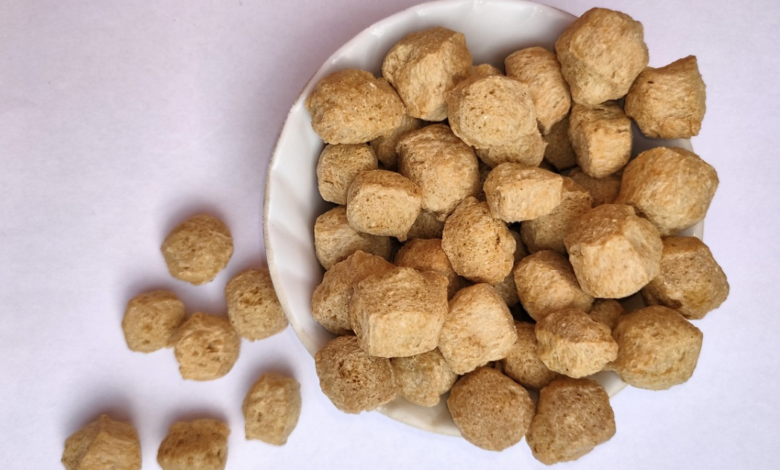How To Eat Soya Chunks After Workout?

After a strenuous workout, it’s vital to consume the right nutrients to support muscle recovery and growth. Eating soya chunks, also known as textured vegetable protein, as part of your post-workout meal is highly recommended. Soya chunks are an excellent plant-based protein source that can significantly enhance muscle tissue repair and development. Make sure to eat soya chunks after your workout for optimal results.
In this guide, we will explore how to incorporate soya chunks into your post-workout diet effectively. Whether you’re a vegetarian, vegan, or simply looking to diversify your protein sources. These tips will help you make the most of soya chunks for a delicious and nourishing post-workout experience.

Understanding Soya Chunks
Soya chunks, also known as soy meat or textured vegetable protein (TVP), have gained popularity as a widely used plant-based protein option in vegetarian and vegan diets. The Soya chunks manufacturers process defatted soy flour into small, dry, and textured pieces that resemble meat in terms of appearance and texture.
Soya chunks are highly nutritious, as they are a rich source of high-quality protein, fiber, essential amino acids, and minerals such as iron and calcium. They are also low in fat and contain no cholesterol. People often consume soya chunks as a meat substitute and can cook them in various ways. Additionally, it is beneficial to eat soya chunks after a workout due to their high protein content.
Including stir-frying, boiling, or incorporating them into curries, stews, and soups.
Thanks to their neutral taste, these versatile chunks absorb the flavors of the spices and ingredients they are cooked with. Soya chunks are not only a convenient and affordable protein source but also a sustainable alternative to animal-based proteins, making them a popular choice among individuals looking to reduce their meat consumption or adopt a plant-based lifestyle.
Why Consume Soya Chunks after a Workout?
Consuming soya chunks after a workout can provide several benefits for post-workout recovery and muscle growth. Defatted soy flour makes soya chunks, also known as soy protein nuggets or soy meat.
Here’s why they are a popular choice among fitness enthusiasts:
- High Protein Content: Soya chunks are an excellent source of plant-based protein, containing all essential amino acids necessary for muscle repair and growth. Protein is crucial for repairing damaged muscle tissues and promoting muscle synthesis.
- Muscle Recovery: After an intense workout, your muscles need nutrients to recover. Soya chunks offer a quick and convenient source of protein to kickstart the recovery process, reducing muscle soreness and aiding in faster recuperation.
- Low in Fat: Soya chunks are low in fat, making them an ideal post-workout food option. They provide protein without adding excessive calories, helping maintain a healthy weight and lean muscle mass.
- Versatile and Nutrient-Dense: Soya chunks are versatile and can be incorporated into various dishes such as stir-fries, curries, salads, or even consumed as a standalone snack. They are also rich in other essential nutrients like iron, calcium, and B-vitamins.
Remember to consult a healthcare professional or a registered dietitian, who can guide you on the appropriate portion size, overall nutritional needs, and incorporating specific foods like eat soya chunks after your workout, based on your fitness goals and dietary requirements.
Importance of Post-Workout Nutrition
Post-workout nutrition, including the consumption or eat of soya chunks, plays a crucial role in maximizing exercise benefits, aiding in recovery, replenishing energy stores, repairing tissues, and promoting muscle growth and adaptation.
Consuming a combination of carbohydrates and protein after a workout is essential. Carbohydrates replenish glycogen stores, which are the primary fuel source for muscles during exercise. Protein, on the other hand, provides the building blocks necessary for muscle repair and growth. The timing of post-workout nutrition is also important, as the body is more receptive to nutrient uptake immediately after exercise.
By providing the body with the right nutrients at the right time, post-workout nutrition helps optimize recovery, reduce muscle soreness, and enhance muscle protein synthesis. It also supports the immune system and helps prevent muscle loss. Neglecting post-workout nutrition can lead to slower recovery, decreased muscle growth, and increased risk of injury. Therefore, prioritizing proper nutrition after a workout is crucial for individuals looking to improve performance, build muscle, and maintain overall health and well-being.
Soya chunks as a post-workout protein source
Soya chunks provide an excellent plant-based protein source that can benefit post-workout recovery. These small, textured vegetable protein nuggets derive from soybeans and pack essential amino acids, making them an ideal choice for muscle repair and growth.
One of the main advantages of soya chunks is their high protein content, making them comparable to many animal-based protein sources. They provide approximately 52 grams of protein per 100 grams. Protein is crucial for repairing and rebuilding muscle tissue after intense workouts, and soya chunks offer a convenient and vegetarian option for meeting these protein needs. For optimal benefits, it is recommended to eat soya chunks after a workout.
Furthermore, soya chunks are also low in fat and cholesterol, making them a healthier alternative to certain animal-based protein sources. They are rich in fiber, vitamins, and minerals, which can aid in digestion and overall nutrient absorption.

Preparation methods for soya chunks
Soya chunks, also known as soy nuggets or soy meat, originate from defatted soy flour and serve as a popular plant-based protein source. In vegetarian and vegan dishes, people widely use them as a substitute for meat due to their meat-like texture.
Here are some common preparation methods for soya chunks:
- Rehydration: Soya chunks are typically dry and need to be rehydrated before use. To do this, soak them in warm water for 15-20 minutes or until they become soft and double in size. Squeeze out the excess water before cooking.
- Boiling: After rehydration, you can boil the soya chunks in water for 5-7 minutes. This helps to remove any raw taste and further softens them. Drain the boiled chunks and rinse them with cold water.
- Marinating: Marinating the soya chunks can add flavor and enhance their taste. Prepare a marinade of your choice using spices, herbs, and sauces. Coat the drained soya chunks with the marinade and let them sit for at least 30 minutes before cooking.
- Stir-frying: Heat oil in a pan and add the marinated soya chunks. Stir-fry them with vegetables, spices, and sauces of your choice until they are well-cooked and the flavors are infused.
- Gravy-based dishes: Soya chunks can be added to curries, stews, or other gravy-based dishes. Simmer them in the sauce until they absorb the flavors and become tender.
Remember to adjust the cooking time and seasonings based on your preference and the specific recipe you are following. Soya chunks offer a nutritious and protein-rich alternative to meat and find utility in a variety of dishes.
Incorporating Soya Chunks into Post-Workout Meals
Incorporating Soya Chunks into post-workout meals can be a nutritious and protein-packed addition to aid in muscle recovery and growth. Soya chunks, also known as textured vegetable protein (TVP), are derived from soybeans and offer several benefits for post-workout nutrition.
Firstly, eat soya chunks are an excellent source of plant-based protein after workout. They provide all the essential amino acids required for muscle repair and synthesis. Consuming an adequate amount of protein after a workout helps to promote muscle recovery and prevent muscle breakdown.
Additionally, soya chunks are low in fat and cholesterol-free, making them a healthy choice for post-workout meals. They are also rich in dietary fiber, which aids in digestion and promotes satiety.
Nutritional benefits of soya chunks
Soya chunks, also known as soy nuggets or soy meat, are a popular plant-based protein source with several nutritional benefits. Soybeans yield these small, textured pieces, providing a wide range of essential nutrients.
First and foremost, soya chunks are an excellent source of high-quality protein. They contain all the essential amino acids required by the human body, making them a valuable option for vegetarians and vegans. Protein is crucial for building and repairing tissues, as well as supporting muscle growth.
Additionally, soya chunks are rich in dietary fiber, which aids in digestion and helps maintain a healthy digestive system. They are also low in saturated fat and cholesterol-free, making them heart-friendly and suitable for individuals aiming to reduce their cholesterol intake.
Moreover, soya chunks contain important minerals such as iron, calcium, and potassium, which contribute to overall bone health, blood cell formation, and regulation of blood pressure. They are also a source of vitamin B12, a nutrient commonly found in animal-based products.
In summary, soya chunks offer a host of nutritional benefits, including high-quality protein, dietary fiber, essential minerals, and certain vitamins. Incorporating them into a well-balanced diet can contribute to overall health and well-being.
Soya Chunks for Different Dietary Needs
Soya chunks, also known as soy protein nuggets or textured vegetable protein, are a versatile food product that can cater to various dietary needs.
These plant-based protein alternatives offer high nutrition and can incorporate into various diet plans.
For individuals following a vegetarian or vegan diet, soya chunks provide a rich source of protein. An excellent meat substitute, they enhance the protein content in dishes like stir-fries, curries, and stews.
Soya chunks, which are naturally gluten-free, are a suitable choice for those with gluten intolerance or celiac disease. They can be used in gluten-free recipes as a substitute for meat or as a protein-rich ingredient. Additionally, incorporating or eat soya chunks into your diet after a workout can be beneficial.
Conclusion
In conclusion, incorporating soya chunks into your post-workout nutrition can be a beneficial choice. These plant-based protein-rich morsels provide essential amino acids that aid in muscle recovery and growth. To optimize their benefits, consider consuming soya chunks within an hour after your workout.
They can be prepared by soaking them in hot water for 15-20 minutes, draining the water, and then incorporating them into your preferred recipe, such as stir-fries, curries, or salads. By including soya chunks in your post-workout meal, you can enhance your protein intake and support your fitness goals.

FAQs
How to eat soya chunks for muscle gain?
To maximize muscle gain with soya chunks, consume them as part of a balanced diet, alongside resistance training and adequate protein intake.
Is soya chunks good for workout?
Yes, soya chunks are good for workouts as they are high in protein and help in muscle recovery and growth.
What is the best way to eat soya chunks?
Soya chunks can be boiled, marinated, and cooked in various recipes like curries, stir-fries, or salads for a delicious and nutritious meal.
How much protein is in 30g of soya chunks?
Approximately 20 grams of protein can be found in 30 grams of soya chunks.




Usually I do not read article on blogs however I would like to say that this writeup very compelled me to take a look at and do it Your writing style has been amazed me Thank you very nice article
Thanks for your words